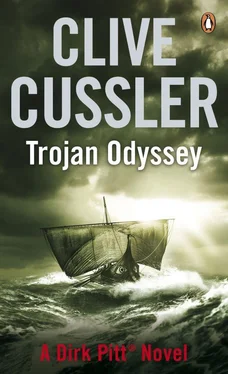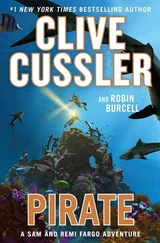Many wanted to leave the great gate open as a symbol of victory, but saner minds prevailed and the gate was closed and bolted.
They had erupted out of the north and east, ten weeks before, sailing across the green sea in hundreds of ships before landing in the bay surrounded by the great Ilium plain. Seeing much of the lowlands filled with swamps, the Achaeans set up their camp on a headland protruding into the sea and off-loaded their fleet of ships.
Because their keels were tarred, the hulls were black below the waterline but above sported a myriad of colors preferred by the various kings of the fleet. They were propelled by rowers with long oars and steered with large oars mounted astern. With bow and stern virtually identical in symmetry they could be rowed in either direction. Unable to sail into the wind, a large square sail was raised only when the breeze blew from astern. Platforms rose fore and aft while carved birds, mostly hawks and falcons, sat above the bow stem. The number of crewmen varied from one hundred and twenty warriors in the troop ships to twenty in the supply transports. Most were manned by a crew of fifty-two, including the commander and a pilot.
Leaders of small kingdoms formed a loose alliance to pillage and raid coastal towns up and down the coast, much like the Vikings two thousand years later. They came from Argos, Pylos, Arcadia, Ithaca and a dozen other regions. Though considered large men for their time, few stood over five feet four inches. They fought ferociously, protected by cuirasses of beaten bronze, plates covering the front of the body and connected by leather thongs. Bronze helmets fit flush over their head, some with horns, some with pointed topknots, most all of them embossed with the owner's personal crest. Armor called greaves was worn that covered the lower legs and arms.
They were masters of the spear, their preferred weapon, and only used their short swords when their spears were shattered or lost. Fighters of the Bronze Age seldom used the bow and arrow, considering it a coward's weapon. They fought from behind huge shields made from six to eight layers of cowhide sewn with leather thongs to a wicker frame with the outer edges in bronze. Most were round, but many were in the shape of a figure eight.
Strangely, unlike warriors of other kingdoms or cultures, the Achaeans did not use horses as cavalry, nor did they charge with chariots. They employed chariots mostly for transportation, carrying men and supplies back and forth from the battlefield. The Achaeans chose to fight on foot as did the Dardanians of Ilium. But this was not simply a war to conquer and take over a territory as rulers. This was not merely a war for plunder. It was an invasion to gain ownership of a metal almost as precious as gold.
Before beaching their ships at Ilium, the Achaeans had raided a dozen towns and cities up and down the coast, taking a hoard of treasure and many slaves, mostly women and children. But they could only imagine the vast wealth that was guarded by the thick walls of Ilium and its determined defenders.
There was apprehension in their ranks as the warriors stared at the city standing on the end of a rocky promontory and studied its massive stone walls and sturdy towers with the king's palace rising above the center. Now as their objective stood before them it became obvious that unlike the others towns and cities they had sacked, this one would not fall without a long and lengthy campaign.
This fact came home when the Dardanians sallied forth from their fortress city and attacked the Achaeans as they landed, nearly driving off the vanguard of the invading fleet before the rest of the ships arrived and unloaded their main force. The Dardanians, soon outnumbered, retreated to the safety behind the main gate of the city after dealing the Achaeans a bloody nose.
For the next ten weeks the battle raged back and forth across the plain. The Dardanians fought tenaciously. Bodies piled up and were strewn from the Achaean camp to the walls of the Ilium citadel as the great heroes and champions of both sides fought and died. At the end of the day, huge pyres were laid by each side and the fallen were cremated. Mounds were later erected over the burned-out pyres as monuments. Thousands died and the seemingly endless battles never diminished.
Brave Hector, son of King Priam and the greatest warrior of Ilium, fell, as did his brother Paris. Mighty Achilles and his friend Patroclus were among the many Achaean dead. With their greatest hero gone, the leaders of the Achaeans, kings Agamemnon and Menelaus, were ready to give up the siege and sail for home. The citadel walls had proven too formidable to penetrate. Food supplies ran low and they had to scrounge the countryside, soon purging the land of all agricultural growth, while the Dardanians were supplied by their allies outside the kingdom who had joined them in the war.
Depressed with certain defeat, they began making plans to strike their camp and disembark, when wily Odysseus, king of Ithaca, came up with a canny plan for a last-ditch effort.
While Ilium partied, the Achaean fleet returned under cover of darkness. Swiftly they rowed from the nearby island of Tenedos where they had hidden during the daylight hours. Guided by a beacon fire ignited by the deceitful Sinon, they beached their keels again, donned their armor and marched quietly across the plain, carrying a colossal log in slings of braided rope.
Aided by a pitch-dark night with no hint of a moon, they stopped within a scant hundred yards of the gate without being discovered. Scouts led by Odysseus crept around the huge horselike structure and approached the gate.
In the guard tower above, Sinon slew the two slumbering guards. Never intending to open the gate by himself — it took eight strong men to lift the huge wooden bar securing the thirty-foot-high doors — he quietly called down to Odysseus.
"The guards are dead and the city is either drunk or asleep. There is no better time to break down the gates."
Odysseus quickly ordered the men who were carrying the immense log to tilt up the forward end and place it on a small ramp leading into the interior of the horse. While a team pushed from the bottom, another group of Achaeans climbed inside and pulled it up under the peaked roof. Once inside, it was lifted onto slings until it was suspended in the air. What the Dardanians never realized was that the horse, as Odysseus had conceived it, was not a horse but a battering ram.
The men inside the ram hauled the log back as far as it would go and hurled it forward.
The pointed bronze beak that fitted over the end of the log struck the wooden gate with a dull thud that shuddered the gate in its hinges but did not force it open. Again and again the ram was plunged against the foot-thick beam-supported gate. With each strike it splintered but did not give. The Achaeans were fearful that a Dardanian might hear the pounding, look over the wall, see the army below and alert the warriors sleeping off their premature jubilation. High on the top of the wall, Sinon also kept a wary eye on any townsman who might have heard the noise, but those still awake thought it was the sound of distant thunder.
The exertion began to look like an exercise in futility when suddenly the gate dropped off one hinge. Odysseus urged his crew inside the ram for one more mighty effort, placing his arms around the log and lending his muscle to the thrust. The warriors hurled the beak into the stubborn door with every ounce of strength they possessed.
At first the door seemed unconquerable, but then the Achaeans held their breath as it sagged on its remaining hinge for a few moments before giving a rueful tearing moan and falling backward into the citadel, dropping flat on the stone pavement with a great rumbling thump.
Like famished wolves, the Achaean army surged into Ilium, howling like madmen. Like an unstoppable tide they swept through the streets. The frustration flowing in their breasts from ten weeks of unending battle that had accomplished nothing but the death of their comrades, spilled over in a blood lust of ferocity. No one was safe from their swords and spears. They stormed into houses, slaying left and right, killing the men, looting valuables and abducting the women and children before burning everything in sight.
Читать дальше












